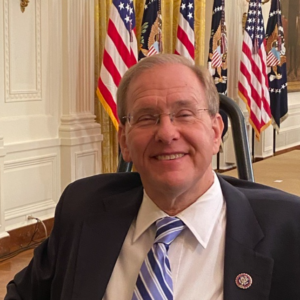Former Congressman Langevin is a lifelong public servant who has always worked to make government better in service of the American people, solving tough challenges to improve their lives. As a bipartisan lawmaker and self-described policy-wonk, he was known for evaluating initiatives for their policy merits, not for political gain. He is a critical thinker, team player, and a fierce advocate for the American people, able to reach across the aisle to find consensus, even in the most polarizing of climates to get things done.
American people, solving tough challenges to improve their lives. As a bipartisan lawmaker and self-described policy-wonk, he was known for evaluating initiatives for their policy merits, not for political gain. He is a critical thinker, team player, and a fierce advocate for the American people, able to reach across the aisle to find consensus, even in the most polarizing of climates to get things done.
Injured at the age of 16 because of an accidental gun discharge while serving as a Police Explorer, Congressman Langevin was left paralyzed. The tremendous outpouring of support from his community inspired him to enter public service and give back to those who had so ardently supported him. In his first election to Congress, he famously pledged to his constituents, “I’ll stand up for you.”
First elected to the 107th Congress in 2000, Congressman Langevin served 11 terms in Washington, DC in service of the 2nd Congressional District of Rhode Island. He was a senior member of the House Armed Services Committee – where he has served at the helm of the subcommittee focused on emerging threats and advanced capabilities since 2011 – as well as the House Committee on Homeland Security and the House Permanent Select Committee on Intelligence (HPSCI). He helped shape the focus of the Department of Defense, paving the way for an improved emphasis on harnessing more innovative technologies to solve our nation’s most complex challenges. He worked to strengthen the research and development ecosystem, transition promising technologies into the hands of our servicemembers, and promote centers of innovation across the Department.
In addition to his role as a leading voice in cybersecurity policy and an expert in matters of national security in the House of Representatives, Congressman Langevin was appointed to the prestigious Cyberspace Solarium Commission in 2018, going on to lead congressional efforts to pass measures built on the Commission’s recommendations into law. He played an essential role securing the infrastructure and resources needed to make cybersecurity a top policy priority by authoring the National Cyber Director Act, which led to the installation of a National Cyber Director at the White House, and by helping to stand up the Cybersecurity and Infrastructure Security Agency (CISA).
